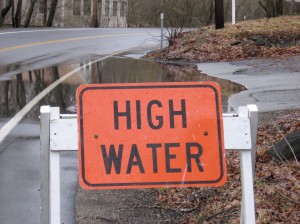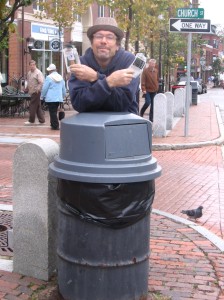CONTACT:
Steve Miller GBNERR CTP, 603-778-0015
Peter Wellenberger, 603-868-1095
October 22, 2010
Regional Climate Assessment Report: Climate Change in the Great Bay Watershed
 |
DURHAM, N.H.— The Great Bay Stewards have been awarded a N.H. Charitable Foundation Community Impact Grant, with funding from the Barbara K. and Cyrus B. Sweet III Fund and the Climate and Energy Action Fund. The grant supports the research, writing and outreach program of a detailed assessment of climate change for coastal New Hampshire. The report will describe how the region’s climate has changed over the past century, and how climate may change over the course of this century, based on different global greenhouse gas emission scenarios.
Carbon Solutions New England will perform the research and writing of the assessment of climate change. CSNE Director Dr. Cameron Wake has extensive experience developing these assessments for regions and watersheds. The report will be comprised of three sections: historical climate trends of the past century; future climate projections; and analysis of changes in 100-year flooding in coastal New Hampshire from projected sea level rise.
The Great Bay National Estuarine Research Reserve Coastal Training Program (CTP) will develop and implement the outreach program to desseminate the report and will assist organizations and municipalities in utilizing the report in their planning. The information compiled in this climate change assessment, combined with the CTP training programs, will provide the foundation for developing local climate change adaptation plans. The report and series of presentations titled “Climate Change in the NH Coastal Watershed: Past, Present, and Future” will be available in the spring of 2011. To receive a copy of the report and/or schedule a presentation on its findings, contact Steve Miller at (603) 778-0015.
The findings will help meet the state’s need for detailed, decision-relevant information, as identified in two of the ten key recommendations in the 2009 New Hampshire Climate Action Plan — developing a plan for how to address existing and potential climate change impacts; and developing an integrated education, outreach, and workforce training program.
The New Hampshire Charitable Foundation serves communities throughout New Hampshire, southeastern Maine and eastern Vermont. The Foundation manages a growing collection of charitable funds created by individuals, families and corporations, and awards more than $30 million annually in grants and scholarships. The Charitable Foundation is nonpartisan, frequently playing the role of convener and catalyst on a broad spectrum of issues. Based in Concord, the Charitable Foundation roots itself in the communities through regional advisory boards. Visitwww.nhcf.org.
The Great Bay National Estuarine Research Reserve is managed by the New Hampshire Fish and Game Department, in cooperation with National Oceanic and Atmospheric Administration (NOAA). The Great Bay Stewards work to protect and preserve the vitality of the Great Bay estuarine system through education, land protection, research and care of the Great Bay. Members work with the Great Bay National Estuarine Research Reserve and other conservation-minded organizations to achieve these goals.



 Posted by David Anderson
Posted by David Anderson 
